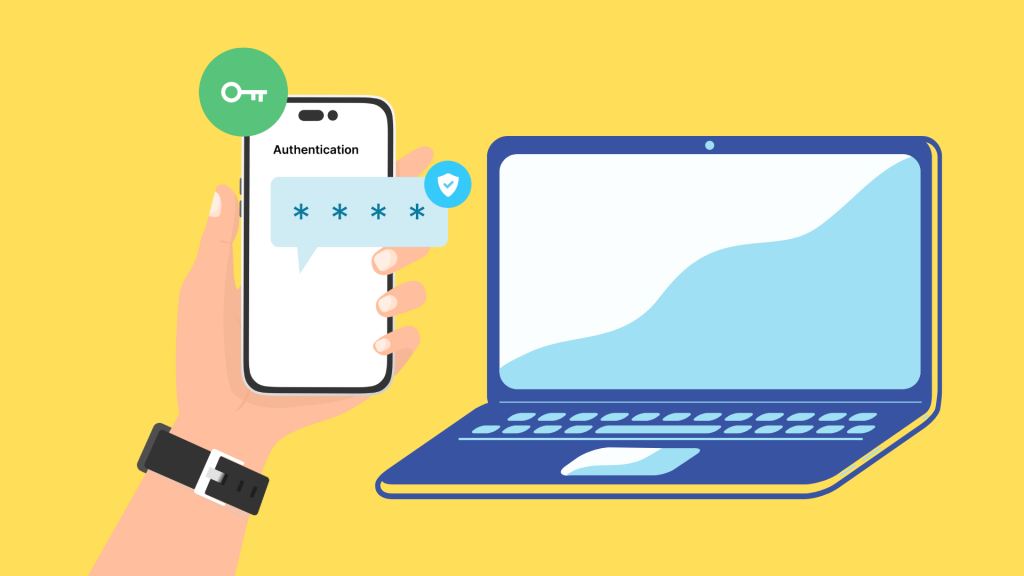You may be wondering: Why does my business need Multi-Factor Authentication? If you’ve heard about it before, the idea of it may have even put you off. It’s a common misconception that enabling MFA is going to cause an inconvenience for users.
Adding another step to the login process might seem unnecessary at first, but it’s a very small adjustment to make when considering just how beneficial it is at protecting your business and its data from outside threats.
According to Microsoft, MFA can prevent 99.99% of account compromise attacks
What is MFA?
Multi-Factor Authentication (MFA) adds an all-important extra layer to logging into your organisation’s network beyond a single password, this will be something that a hacker would not have access to. This could be:
- By code sent via email or text.
- Receiving an authentication app on your mobile.
- Fingerprint or face scan.
- A code that appears on a physical key card.
MFA is an efficient and proven way of improving security and protecting against account-compromising attacks.
Reasons Your Business Should Have MFA
Prevent Loss of Revenue
Prevention is always better than a cure and even with the fastest response to a cyberattack, there can be severe repercussions. The disruption of business due to downtime can cost SMBs between £68,000 and £320,000 an hour.
Customers will lose faith in a business after a cyberattack and according to IBM an average of 56% of customers will stop doing business with a company that has suffered a cyber attack altogether.
60% of small businesses will not recover from a cyberattack.
Protect Against Weak Passwords
Passwords can be frustrating; many people find themselves struggling to remember their passwords so opt for one that’s easy to remember (and easy to guess) and will use the same password across accounts.
Nordpress reports that ‘123456’, ‘password’ and ‘qwerty’ are still the most used passwords globally.
Some companies enforce policies on passwords, requiring stronger passwords and for employees to regularly update them. But this also means the same employees are more likely to forget their passwords. Having to frequently have passwords reset takes time out of the working day.
With MFA, users can sign in securely and easily with various methods, reducing the need to keep updating complex passwords.
Defend Against Credential Theft
It’s not only weak passwords you need to worry about, even with the strictest password policies attackers can find ways to steal passwords. Cybercriminals can install keylogging malware, deploy phishing tactics, or use malicious code to redirect users to a fraudulent website to log in – this is called pharming.
Not to mention if a cybercriminal manages to get data through hacking another company that users have accounts with, passwords could be compromised, this is called a supply chain attack. This is particularly problematic if the users use the same password across all their accounts.
Anyone can fall victim to one of these attacks.
Ensure Your Security Tools Can Do Their Job
Once a hacker has your password, they can use it to bypass security measures. If the user who has had credentials stolen has the access to disable firewalls and antivirus software, then these security measures are redundant. You won’t even know it’s happened until it’s too late.
MFA, apart from stopping these hackers from gaining access in the first place, can also alert users of unauthorized attempts to access their accounts.
Secure Unmanaged Remote Devices
Remote and Hybrid working remains common practice and doesn’t look like it is going anywhere. But employees often use personal devices and less secure home internet connections to access work networks. Unmanaged devices and connections are susceptible to hackers, enabling them to install password-stealing malware without detection.
MFA enables a secure log-on for employees who need remote access.
NEED HELP SETTING UP MFA AT YOUR COMPANY?
The cost of a breach can cripple an organisation past the point of repair. Adding Multi-Factor Authentication as an extra step is simply good business sense. Passwords alone are not enough.
Reach out to us today if you need help finding the best MFA solution for your organisation.
